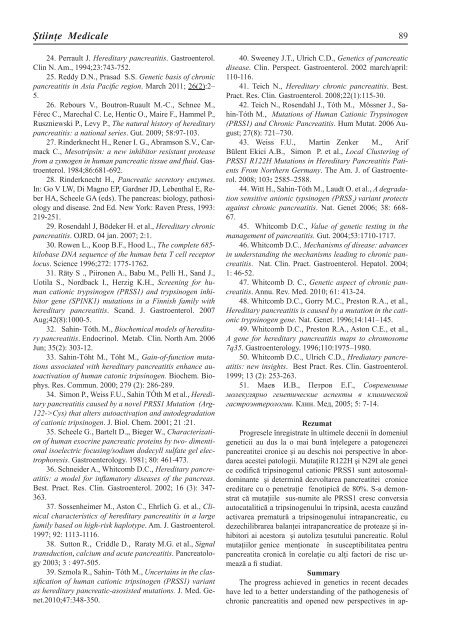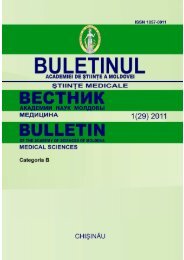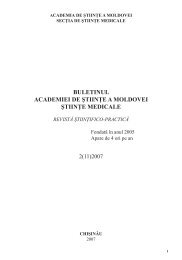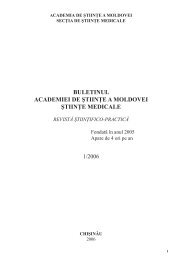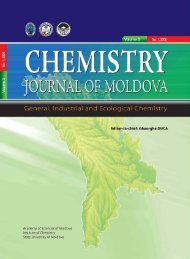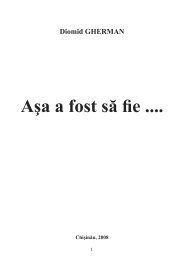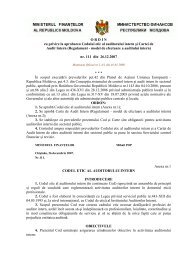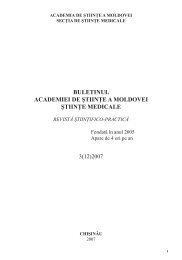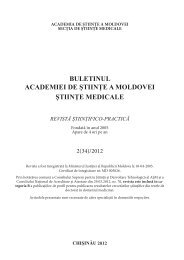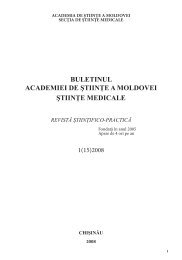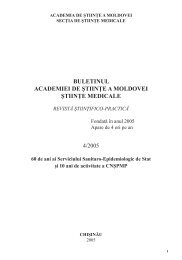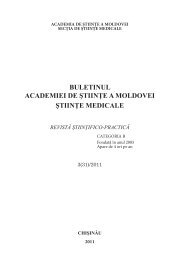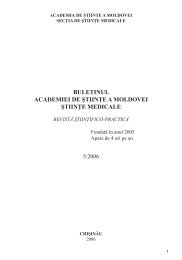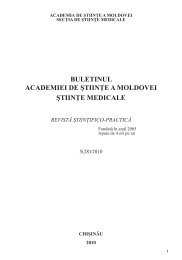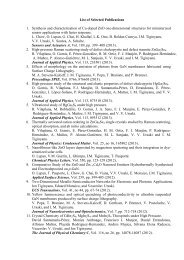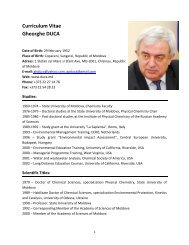stiinte med 1 2012.indd - Academia de ÅtiinÅ£e a Moldovei
stiinte med 1 2012.indd - Academia de ÅtiinÅ£e a Moldovei
stiinte med 1 2012.indd - Academia de ÅtiinÅ£e a Moldovei
You also want an ePaper? Increase the reach of your titles
YUMPU automatically turns print PDFs into web optimized ePapers that Google loves.
Ştiinţe Medicale<br />
24. Perrault J. Hereditary pancreatitis. Gastroenterol.<br />
Clin N. Am., 1994;23:743-752.<br />
25. Reddy D.N., Prasad S.S. Genetic basis of chronic<br />
pancreatitis in Asia Pacifi c region. March 2011; 26(2):2–<br />
5.<br />
26. Rebours V., Boutron-Ruault M.-C., Schnee M.,<br />
Férec C., Marechal C. Le, Hentic O., Maire F., Hammel P.,<br />
Ruszniewski P., Levy P., The natural history of hereditary<br />
pancreatitis: a national series. Gut. 2009; 58:97-103.<br />
27. Rin<strong>de</strong>rknecht H., Rener I. G., Abramson S.V., Carmack<br />
C., Mesotripsin: a new inhibitor resistant protease<br />
from a zymogen in human pancreatic tissue and fl uid. Gastroenterol.<br />
1984;86:681-692.<br />
28. Rin<strong>de</strong>rknecht H., Pancreatic secretory enzymes.<br />
In: Go V LW, Di Magno EP, Gardner JD, Lebenthal E, Reber<br />
HA, Scheele GA (eds). The pancreas: biology, pathosiology<br />
and disease. 2nd Ed. New York: Raven Press, 1993:<br />
219-251.<br />
29. Rosendahl J, Bö<strong>de</strong>ker H. et al., Hereditary chronic<br />
pancreatitis. OJRD. 04 jan. 2007; 2:1.<br />
30. Rowen L., Koop B.F., Hood L., The complete 685-<br />
kilobase DNA sequence of the human beta T cell receptor<br />
locus. Science 1996;272: 1775-1762.<br />
31. Räty S ., Piironen A., Babu M., Pelli H., Sand J.,<br />
Uotila S., Nordback I., Herzig K.H., Screening for human<br />
cationic trypsinogen (PRSS1) and trypsinogen inhibitor<br />
gene (SPINK1) mutations in a Finnish family with<br />
hereditary pancreatitis. Scand. J. Gastroenterol. 2007<br />
Aug;42(8):1000-5.<br />
32. Sahin- Tóth. M., Biochemical mo<strong>de</strong>ls of hereditary<br />
pancreatitis. Endocrinol. Metab. Clin. North Am. 2006<br />
Jun; 35(2): 303-12.<br />
33. Sahin-Tóht M., Tóht M., Gain-of-function mutations<br />
associated with hereditary pancreatitis enhance autoactivation<br />
of human catonic tripsinogen. Biochem. Biophys.<br />
Res. Commun. 2000; 279 (2): 286-289.<br />
34. Simon P., Weiss F.U., Sahin TÓth M et al., Hereditary<br />
pancreatitis caused by a novel PRSS1 Mutation (Arg-<br />
122->Cys) that alters autoactivaţion and auto<strong>de</strong>gradation<br />
of cationic tripsinogen. J. Biol. Chem. 2001; 21 :21.<br />
35. Scheele G., Bartelt D.,, Bieger W., Characterization<br />
of human exocrine pancreatic proteins by two- dimentional<br />
isoelectric focusing/sodium do<strong>de</strong>cyll sulfate gel electrophoresis.<br />
Gastroenterology. 1981; 80: 461-473.<br />
36. Schnei<strong>de</strong>r A., Whitcomb D.C., Hereditary pancreatitis:<br />
a mo<strong>de</strong>l for infl amatory diseases of the pancreas.<br />
Best. Pract. Res. Clin. Gastroenterol. 2002; 16 (3): 347-<br />
363.<br />
37. Sossenheimer M., Aston C., Ehrlich G. et al., Clinical<br />
characteristics of hereditary pancreatitis in a large<br />
family based on high-risk haplotype. Am. J. Gastroenterol.<br />
1997; 92: 1113-1116.<br />
38. Sutton R., Criddle D., Raraty M.G. et al., Signal<br />
transduction, calcium and acute pancreatitis. Pancreatology<br />
2003; 3 : 497-505.<br />
39. Szmola R., Sahin- Tóth M., Uncertains in the classifi<br />
cation of human cationic tripsinogen (PRSS1) variant<br />
as hereditary pancreatic-asosisted mutations. J. Med. Genet.2010;47:348-350.<br />
89<br />
40. Sweeney J.T., Ulrich C.D., Genetics of pancreatic<br />
disease. Clin. Perspect. Gastroenterol. 2002 march/april:<br />
110-116.<br />
41. Teich N., Hereditary chronic pancreatitis. Best.<br />
Pract. Res. Clin. Gastroenterol. 2008;22(1):115-30.<br />
42. Teich N., Rosendahl J., Tóth M., Mössner J., Sahin-Tóth<br />
M., Mutations of Human Cationic Trypsinogen<br />
(PRSS1) and Chronic Pancreatitis. Hum Mutat. 2006 August;<br />
27(8): 721–730.<br />
43. Weiss F.U., Martin Zenker M., Arif<br />
Bülent Ekici A.B., Simon P. et al., Local Clustering of<br />
PRSS1 R122H Mutations in Hereditary Pancreatitis Patients<br />
From Northern Germany. The Am. J. of Gastroenterol.<br />
2008; 103: 2585–2588.<br />
44. Witt H., Sahin-Tóth M., Laudt O. et al., A <strong>de</strong>gradation<br />
sensitive anionic typsinogen (PRSS 2<br />
) variant protects<br />
against chronic pancreatitis. Nat. Genet 2006; 38: 668-<br />
67.<br />
45. Whitcomb D.C., Value of genetic testing in the<br />
management of pancreatitis. Gut. 2004;53:1710-1717.<br />
46. Whitcomb D.C., Mechanisms of disease: advances<br />
in un<strong>de</strong>rstanding the mechanisms leading to chronic pancreatitis.<br />
Nat. Clin. Pract. Gastroenterol. Hepatol. 2004;<br />
1: 46-52.<br />
47. Whitcomb D. C., Genetic aspect of chronic pancreatitis.<br />
Annu. Rev. Med. 2010; 61: 413-24.<br />
48. Whitcomb D.C., Gorry M.C., Preston R.A., et al.,<br />
Hereditary pancreatitis is caused by a mutation in the cationic<br />
trypsinogen gene. Nat. Genet. 1996;14:141–145.<br />
49. Whitcomb D.C., Preston R.A., Aston C.E., et al.,<br />
A gene for hereditary pancreatitis maps to chromosome<br />
7q35. Gastroenterology. 1996;110:1975–1980.<br />
50. Whitcomb D.C., Ulrich C.D., Hrediatarу pancreatitis:<br />
new insights. Best Pract. Res. Clin. Gastroenterol.<br />
1999; 13 (2): 253-263.<br />
51. Маев И.В., Петров Е.Г., Современные<br />
молекулярно генетические аспекты в клинической<br />
гастроэнтерологии. Клин. Мед, 2005; 5: 7-14.<br />
Rezumat<br />
Progresele înregistrate în ultimele <strong>de</strong>cenii în domeniul<br />
geneticii au dus la o mai bună înţelegere a patogenezei<br />
pancreatitei cronice şi au <strong>de</strong>schis noi perspective în abordarea<br />
acestei patologii. Mutaţiile R122H şi N29I ale genei<br />
ce codifică tripsinogenul cationic PRSS1 sunt autosomaldominante<br />
şi <strong>de</strong>termină <strong>de</strong>zvoltarea pancreatitei cronice<br />
ereditare cu o penetraţie fenotipică <strong>de</strong> 80%. S-a <strong>de</strong>monstrat<br />
că mutaţiile sus-numite ale PRSS1 cresc conversia<br />
autocatalitică a tripsinogenului în tripsină, acesta cauzând<br />
activarea prematură a tripsinogenului intrapancreatic, cu<br />
<strong>de</strong>zechilibrarea balanţei intrapancreatice <strong>de</strong> proteaze şi inhibitori<br />
ai acestora şi autoliza ţesutului pancreatic. Rolul<br />
mutaţiilor genice menţionate în susceptibilitatea pentru<br />
pancreatita cronică în corelaţie cu alţi factori <strong>de</strong> risc urmează<br />
a fi studiat.<br />
Summary<br />
The progress achieved in genetics in recent <strong>de</strong>ca<strong>de</strong>s<br />
have led to a better un<strong>de</strong>rstanding of the pathogenesis of<br />
chronic pancreatitis and opened new perspectives in ap-


